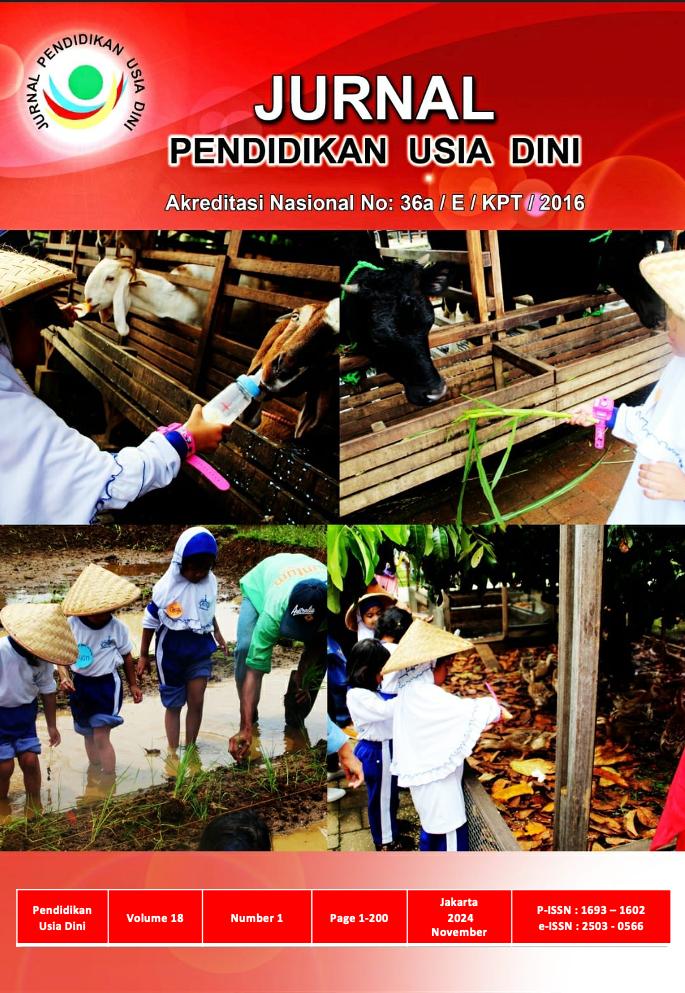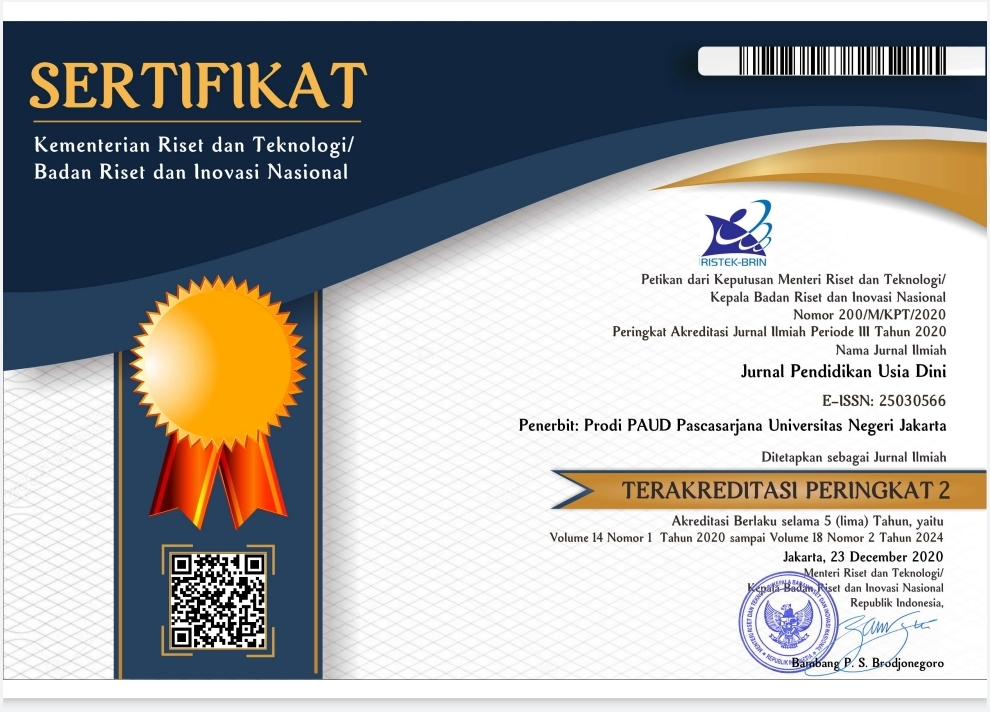Implementation of Character Education Based on Total Quality Management: Strengthening the Profile of Pancasila Students in Kindergarten
DOI:
https://doi.org/10.21009/JPUD.181.14Abstract
This research is applied research that aims to develop and implement a character education action plan based on Total Quality Management (TQM) in the Pancasila student profile in Independent Curriculum in Kindergarten. This research is a qualitative descriptive study, data was collected through Focus Group Discussion (FGD), interviews, observation, and documentation. The results of the research show that TQM-based character education in Tunas Bangsa Kindergarten through the implementation of action plans in Pancasila student profile in the independent curriculum, implemented in learning projects and children's habits, has achieved guaranteed quality of learning. The results of the implementation show that children have achieved guaranteed quality graduates through learning project activities and familiarization with the supporting capacity of skilled teacher human resources, adequate facilities, and infrastructure as well as religious and moral development for adult children. Learning projects and habits are implemented for children to achieve the guaranteed quality of graduates, carrying out daily prayers, carrying out religious ritual practices, praying before and after studying, praying for parents and family, putting on and taking off your shoes, wearing uniform according to schedule, and complete tasks according to the deadline. For further research, it is necessary to carry out research that examines various implementations of character education based on culture or other learning models that attract children's interest and are more comprehensive.
Keywords: action plan, early childhood, character education, total quality management
References:
Ahmad, S., Wasim, S., Irfan, S., Gogoi, S., Srivastava, A., & Farheen, Z. (2019). Qualitative v/s. Quantitative Research- A Summarized Review. Journal of Evidence Based Medicine and Healthcare, 6(43), 2828–2832. https://doi.org/10.18410/jebmh/2019/587
Alannasir, W. (2020). Characteristic-Based Development Students Aspect. International Journal of Asian Education, 1(1), 29–36. https://doi.org/10.46966/ijae.v1i1.18
Angga, A., Suryana, C., Nurwahidah, I., Hernawan, A. H., & Prihantini, P. (2022). Komparasi Implementasi Kurikulum 2013 dan Kurikulum Merdeka di Sekolah Dasar Kabupaten Garut. Jurnal Basicedu, 6(4), 5877–5889. https://doi.org/10.31004/basicedu.v6i4.3149
Ann Cutler, N., Halcomb, E., & Sim, J. (2021). Using naturalistic inquiry to inform qualitative description. Nurse Researcher, 29(3), 29–33. https://doi.org/10.7748/nr.2021.e1788
Brown Wilson, C., & Slade, C. (2020). From consultation and collaboration to consensus: Introducing an alternative model of curriculum development. International Journal for Academic Development, 25(2), 189–194. https://doi.org/10.1080/1360144X.2019.1584897
Fink, C. K. & Philosophy Documentation Center. (2020). Acting with Good Intentions: Virtue Ethics and the Principle that Ought Implies Can. Journal of Philosophical Research, 45, 79–95. https://doi.org/10.5840/jpr20201230157
Flores, M. A. (2016). Teacher Education Curriculum. In J. Loughran & M. L. Hamilton (Eds.), International Handbook of Teacher Education (pp. 187–230). Springer Singapore. https://doi.org/10.1007/978-981-10-0366-0_5
Hardjono, T., & van Kemenade, E. (2021). The Emergence Paradigm in Quality Management: A Way Towards Radical Innovation. Springer International Publishing. https://doi.org/10.1007/978-3-030-58096-4
Ikhsan, N. F., Salim, C. R., & Tasya, D. A. (2023). Total Quality Management (TQM) And Its Implementation In Islamic Education Management. AL-WIJDÃN Journal of Islamic Education Studies, 8(4), 527–542. https://doi.org/10.58788/alwijdn.v8i4.3188
Jannah, M. M., & Rasyid, H. (2023). Kurikulum Merdeka: Persepsi Guru Pendidikan Anak Usia Dini. Jurnal Obsesi : Jurnal Pendidikan Anak Usia Dini, 7(1), 197–210. https://doi.org/10.31004/obsesi.v7i1.3800
Kulakow, S., & Raufelder, D. (2020). Enjoyment benefits adolescents’ self-determined motivation in student-centered learning. International Journal of Educational Research, 103, 101635. https://doi.org/10.1016/j.ijer.2020.101635
Maryani, K., & Sayekti, T. (2023). Pelaksanaan Projek Penguatan Profil Pelajar Pancasila pada Lembaga Pendidikan Anak Usia Dini. Murhum : Jurnal Pendidikan Anak Usia Dini, 4(2), 609–619. https://doi.org/10.37985/murhum.v4i2.348
McCoy, L., Pettit, R. K., Kellar, C., & Morgan, C. (2018). Tracking Active Learning in the Medical School Curriculum: A Learning-Centered Approach. Journal of Medical Education and Curricular Development, 5, 238212051876513. https://doi.org/10.1177/2382120518765135
Miles, M. B., Huberman, A. M., & Saldana, J. (2018). Qualitative Data Analysis (Fourth Edition). Sage.
Nursalam, N., Sulaeman, S., & Latuapo, R. (2023). Implementasi Kurikulum Merdeka melalui Pembelajaran Berbasis Proyek pada Sekolah Penggerak Kelompok Bermain Terpadu Nurul Falah dan Ar-Rasyid Banda. Jurnal Pendidikan Dan Kebudayaan, 8(1), 17–34. https://doi.org/10.24832/jpnk.v8i1.3769
Putri, R. K., Bukit, N., & Simanjuntak, M. P. (2021). The Effect of Project Based Learning Model’s on Critical Thinking Skills, Creative Thinking Skills, Collaboration Skills, & Communication Skills (4C) Physics in Senior High School: 6th Annual International Seminar on Transformative Education and Educational Leadership (AISTEEL 2021), Medan, Indonesia. https://doi.org/10.2991/assehr.k.211110.103
Shalehah, N. A. (2023). Pembelajaran Berbasis Proyek sebagai Bentuk Implementasi Kurikulum Merdeka di Satuan PAUD. Islamic EduKids, 5(1), 14–24. https://doi.org/10.20414/iek.v5i1.7139
Sitorus, J. H. E. (2016). Pancasila-based Social Responsibility Accounting. Procedia - Social and Behavioral Sciences, 219, 700–709. https://doi.org/10.1016/j.sbspro.2016.05.054
Sulhiah, Rahman, & Juanda Prisma Mahendra. (2023). Upaya Meningkatkan Kemampuan Sosial Emosional Melalui Implementasi Proyek P5 Di Paud Al Hamzar. Journal Of Early Childhood And Islamic Education, 2(1), 23–29. https://doi.org/10.62005/joecie.v2i1.47
Tractenberg, R. E., Lindvall, J. M., Attwood, T., & Via, A. (2020). Guidelines for curriculum and course development in higher education and training [Preprint]. SocArXiv. https://doi.org/10.31235/osf.io/7qeht
Winther-Lindqvist, D. A. (2021). Caring well for children in ECEC from a wholeness approach – The role of moral imagination. Learning, Culture and Social Interaction, 30, 100452. https://doi.org/10.1016/j.lcsi.2020.100452
Xu, B., Chen, N.-S., & Chen, G. (2020). Effects of teacher role on student engagement in WeChat-Based online discussion learning. Computers & Education, 157, 103956. https://doi.org/10.1016/j.compedu.2020.103956
Yuen, S., Boulton, H., & Byrom, T. (2018). School-based curriculum development as reflective practice: A case study in Hong Kong. Curriculum Perspectives, 38(1), 15–25. https://doi.org/10.1007/s41297-017-0032-8
Downloads
Published
How to Cite
Issue
Section
License
JURNAL PENDIDIKAN USIA DINI work is licensed under a Creative Commons Attribution 4.0 International License. (http://creativecommons.org/licenses/by/4.0/)





